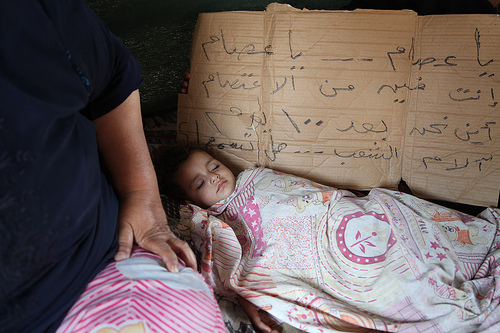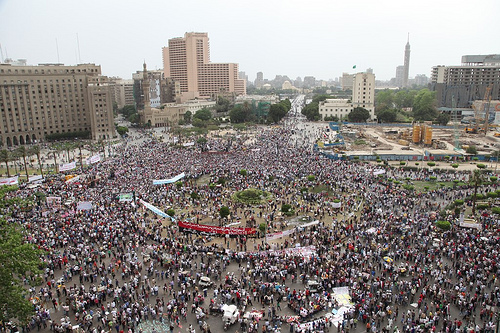
Dozens of families who lost their homes in the first few days of the January 25th revolution are entering the fifth week of what is being described as the first organized protest by homeless people in Egypt. Living in a makeshift encampment in front of the state TV building in downtown Cairo, these families have united to make a single, demand: affordable housing.
Those participating in the sit-in represent only a fraction of the estimated 1,500 families who have been forcibly evicted from their homes over the past few months. Residents say they were kicked out because their landlords heard a rumor that the new government would transfer ownership to the tenants. "When the Jan 25 revolution began, people were saying there was no security in the country," says Abdel Mageed Nabil Mohamed, age 35, a former resident of Salam City. "The owners of the apartments brought thugs in and kicked us out."
The transitional government set up a tent camp on the outskirts of Cairo to house those who lost their homes. The camp lacks adequate sanitation and access to clean drinking water. Residents complain of poor safety and health conditions in the camp, where 20-30 people share a single tent in the summer heat. After months of living in squalid, overcrowded conditions with no clear indication from authorities about when they would receive proper housing, dozens of families decided to take their struggle to the streets. They erected the makeshift camp at Maspero to publicize their plight.
The conditions at Maspero are no better. The protesters, including young children and the elderly, have no access to public bathrooms and are forced to bathe and relieve themselves in the street or in the nearby river Nile. Three people are said to have been killed since the sit-in began, at least one by drowning. And yet they vow to stay until their demands are met.
"Several of our children have died," says homeless protester Faten Hashem Mohamed Abdullah. "We are asking for one thing: an apartment, four walls." While the government has promised to relocate them, so far only 124 homeless families have been placed. The rest have been left to wait.
Amidst the many issues and stories making headlines in post-Mubarak Egypt, the ordeal these families face shines a light on a problem that has been decades in the making in Egypt. Among the many difficult legacies of the Mubarak regime is that of willful neglect. The scarcity of policies to provide affordable housing for the poor is perhaps at the top of that list. "The housing problem in Egypt is a bomb and it will be exploded anytime," says Manal Tibbi, director of the Egyptian Center for Housing Rights. "According to the laws that the Mubarak government adopted, the lower middle class and the poor have been kicked out of the real estate market completely."
An estimated 60% of residents in greater Cairo, most of them poor, live in informal settlements. "There is such an acute shortage of affordable housing that the poor cannot afford to buy or rent housing units in the formal areas," says Amnesty International Researcher Mohamed Lotfy. This includes both private developments as well as government-built housing. For several decades government policies have failed to address this problem and have provided only "informal" settlements for the poor.
While informal settlements themselves range from shacks to decent neighborhoods of brick buildings with running water and electricity, all residents in "informal" areas share a common bond—insecurity and the threat of eviction. "It happens that a lot of the informal settlements were built on desert land owned by the state," Lotfy says. "As the city expands you find these lands become very nice locations . . . Evicting this population makes the most sense, economically speaking. So the government seeks to evict them and rehouse them elsewhere, to take advantage, purely from an investment perspective."
The dearth of affordable housing is directly linked to the implementation of neo-liberal policies that began under Sadat but flourished for decades under Mubarak, Tibbi says. Under pressure from the World Bank and the IMF, state-owned businesses were privatized, worker wages were pushed down, and inflation went up. Legislation was passed that biased housing laws against tenants and labor laws against workers. Without decent jobs or wages, the gap between the least expensive housing available and what people could afford widened. Cairo in particular finds itself growing increasingly economically segregated.
Since Mubarak's ouster, not much has changed in the Egyptian government's housing policies. While the Minister of Housing was removed, the remaining personnel and programs are still in place. Nevertheless, housing rights advocates believe the revolution can be a positive turning point for the housing policy in Egypt. "People started to feel that they have rights and they can protest," Tibbi says. "I'm not optimistic about the military council. I'm optimistic about the people [because] we started to have social movements in Egypt—movements consisting of people who are defending their own rights. It's time for the rule of social movements."
Meanwhile, the homeless protesters at Maspero remain resolute. "We are, at the beginning and the end, children of Egypt. We are citizens of Egypt. We had a beautiful revolution, a respectful revolution and we are asking for our rights in a respectful manner," says. "We are staying here until they get us four walls."



